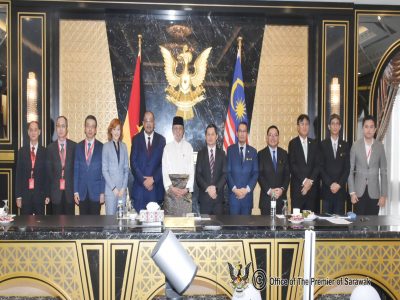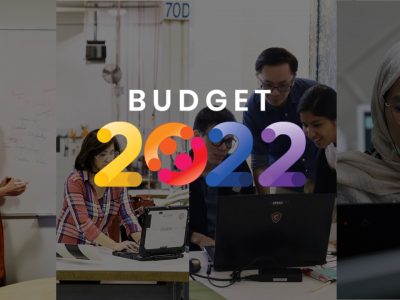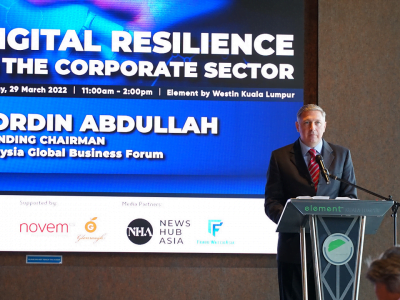SINGAPORE –
Media OutReach – 21 February 2022 –
Blue Prism® (AIM: PRSM), a global leader in intelligent automation, today released findings from its survey report titled “RPA In The APAC Financial Services Sector.” While there is growing momentum in automation efforts by organisations across Asia Pacific (APAC), the report reveals significant disparity of robotic process automation (RPA)[1] adoption within Asia Pacific’s financial services industry. While Australia leads the way with 78 percent of organisations currently using RPA solutions and technologies, India is second with 49 percent, followed by Hong Kong (47 percent), Malaysia (44 percent) and Singapore (28 percent). With only 34 percent in Singapore and 50 percent in Malaysia of respondents indicating familiarity with RPA, there is potential for better comprehension and perception around this technology. This is in comparison to 85 percent in Australia, 82 percent in Hong Kong and 75 percent in India. Robert Dewar, Vice President, Financial Services, APAC, Blue Prism, said
: “While RPA adoption across global industries grew at tremendous speed, this report revealed the disparity of RPA adoption within the APAC financial services industry, indicating a long roadmap before the region reaches RPA and Intelligent Automation maturity. Presently, the use of RPA adoption remains largely a tool to improve efficiency and cut costs, rather than a catalyst to accelerate digital transformation. As markets look to scale up enterprise RPA and Intelligent Automation deployments, our aim is to empower companies to fulfil their vision for strategic business automation and achieve faster, better organisational outcomes.” Almost all of the organisations (95 percent) surveyed felt that the adoption of RPA has improved overall business operations, which includes error and cost reduction (7 percent each), empowering the workforce to concentrate on higher value tasks (24 percent) and increasing efficiencies and speed within the organisation (61 percent). The report also revealed that across Australia, India, Singapore and Malaysia, the top two areas that companies leverage RPA are the finance and IT departments. This differs slightly in Hong Kong, where the top two areas are finance (79 percent) and customer service (71 percent) departments. Within the next two to three years, companies in Australia and India expect to continue leveraging RPA the most in the finance and IT departments, while Hong Kong companies expect the same in the finance and customer service departments. In Malaysia, besides the finance department (61 percent), companies are prioritising RPA programmes in sales and marketing (73 percent) in the next two to three years. Interestingly, the finance department was not included in the top three areas that Singapore companies will be leveraging RPA in the near term, with companies ranking IT departments (61 percent) as the top priority for RPA adoption, followed by sales and marketing (54 percent) and customer service (50 percent). Other key findings for each respective market are as follows: Australia Key Findings - 99 percent of organisations believed that RPA has improved overall business operations, including cost and time savings (88 percent) and increased accuracy and quality of output (76 percent).
- Organisations ranked top considerations when drawing RPA budgets to implementation costs (77 percent) as the most important factor, followed by maintenance costs (70 percent) and ancillary costs (67 percent)
- Of the organisations that are not currently using RPA solutions and technologies (22 percent), 8 percent are planning to implement such technologies within the next six months, and 4 percent are planning to do so within the next year
- Almost nine in 10 (89 percent) organisations said that the future growth of RPA is promising
Hong Kong Key Findings - 96 percent of organisations felt that RPA has improved overall business operations, with significant benefits in cost and time savings (69 percent) as well as increased accuracy and quality of output (69 percent).
- In terms of factors that organisations consider when drawing up an RPA budget, most organisations ranked implementation costs (65 percent) as the most important factor, followed by ancillary costs (60 percent) and maintenance costs (59 percent)
- 52 percent of organisations are not currently using RPA solutions and technologies; 31 percent are planning to implement such technologies within the next six months, and 8 percent are planning to do so within the next year
- 85 percent of organisations said that the future growth of RPA is promising
India Key Findings - 95 percent of organisations felt that RPA has improved overall business operationscost and time savings (83 percent) as the most significant benefit associated with RPA adoption, and RPA as a catalyst for driving digital transformation (76 percent)
- In terms of factors that organisations consider when drawing up an RPA budget, most organisations ranked implementation costs (75 percent) as the most important factor, followed by maintenance costs (62 percent) and ancillary costs (44 percent)
- Of the organisations that are not currently using RPA solutions and technologies (50 percent), 27 percent are planning to implement such technologies within the next six months, and 11 percent are planning to do so within the next year
- More than nine in 10 (93 percent) organisations said that the future growth of RPA is promising
Singapore Key Findings - Among the five markets, Singapore holds the highest percentage of financial institutions (19 percent) that do not use any of the five disruptive technologies (artificial intelligence, business process management, machine learning, deep learning and predictive analytics)
- Almost eight in 10 (79 percent) organisations felt that RPA has improved overall business operations, with a reduction in manpower or burden of administrative personnel (68 percent) as the most significant benefit, and RPA as a catalyst for driving digital transformation (68 percent)
- In terms of factors that organisations consider when drawing up an RPA budget, most organisations ranked maintenance costs (88 percent) as the most important factor, followed by implementation costs (59 percent) and ancillary costs (59 percent)
- Of the organisations that implemented RPA solutions and technologies during the pandemic, most ranked the increased cost and time savings (75 percent) as well as the reduction in manpower or burden of administrative personnel (75 percent) as the most important factors
- 71 percent of organisations said that the future growth of RPA is promising
Malaysia Key Findings - 93 percent of organisations felt that RPA has improved overall business operations, with increasing efficiencies and speed within the organisation as the most main driver of RPA adoption (86 percent), followed by allowing workers to concentrate on higher value tasks (70 percent) and reducing errors (68 percent)
- In terms of factors that organisations consider when drawing up an RPA budget, most organisations ranked implementation costs (69 percent) as the most important factor, followed by maintenance costs (62 percent), ancillary costs (49 percent) and business process value (49 percent)
- Within the next two to three years, 41 percent of organisations expect to invest approximately up to 50 percent of their total automation budget in RPA, and 36 percent organisations expect to invest approximately up to 75 percent of their total automation budget in RPA
- Of the 56 percent of organisations that are not currently using RPA solutions and technologies, 13 percent are planning to implement such technologies within the next six months, and 16 percent are planning to do so within the next year
- More than eight in 10 (84 percent) organisations said that the future growth of RPA is promising
To access the full APAC report findings and insights, please click here.
[1] RPA In The APAC Financial Services Sector focuses on RPA, depicting a general understanding of the traditional RPA landscape. Blue Prism’s technology is incorporated in an
intelligent automation platform, built on the strengths of RPA with artificial intelligence and machine learning capabilities for organisations to future-proof their digital transformation strategies.
Intelligent automation includes competence in knowledge and insight, visual perception, learning, problem solving, collaboration as well as planning and sequencing, which makes traditional RPA even smarter, enhancing what the software robots can achieve for the workforce.
About the report:
The research was commissioned by Blue Prism. Respondents include 802 global business leaders in Australia (200), Hong Kong (201), India (201), Malaysia (100) and Singapore (100). All respondents have worked in financial services for 10 years or more and are in companies with more than 10 employees. All interviews were conducted online from September to October 2021.
Notes to editors:
Blue Prism is a global leader in enterprise robotic process automation (RPA) and intelligent automation, transforming the way work is done. We have over 2,000 customers in over 170 countries and 70 industry verticals, 30 percent in the Forbes Global 2,000, creating value with new ways of working by unlocking efficiencies and returning millions of hours of work back into their businesses. Our enterprise digital robots offer high-scale automation that is secure, smart, accessible to all, enabling centrally managed human and digital workforces of the future and freeing up humans to re-imagine work. To learn more visit  www.blueprism.com and follow us on Twitter
www.blueprism.com and follow us on Twitter  @blue_prism and on
@blue_prism and on  LinkedIn.
LinkedIn.
© 2022 Blue Prism Limited. “Blue Prism”, the “Blue Prism” logo and Prism device are either trademarks or registered trademarks of Blue Prism Limited and its affiliates. All Rights Reserved.
#BluePrism
The issuer is solely responsible for the content of this announcement.

Services
Stakeholder mapping, analysis, engagement and communication needs to be detailed to avoid business losses or even worse, a crisis. How can you do this effectively to prevent failure? ...
Data-driven business decisions have never been as crucial, especially in this era. MGBF leverages off, technology, experience and market presence to aid businesses in making accurate decisions. ...
MGBF provides comprehensive strategic advice and results-focused solutions to solve clients' problems in business-government relations so they can focus on their core business. ...
A critical business challenge is meeting the right decision-makers and potential buyers through the best channel and platform. How will you improve your business competency? ...
Upcoming Events
In this episode of 'A Working Lunch with Nordin', MGBF's Nordin Abdullah and regional commentator Eddin Khoo will discuss the biggest threats and opportunities for businesses as we look to manage change in the South China Sea.
This MGBF Roundtable will feature thought leaders form Japan, Australia, Singapore and Malaysia dealing with the critical issues of manipulation of public listed companies and government and their financial impacts.
A series of networking sessions with various business associations and trade organisations exploring high-value opportunities for business leaders and entrepreneurs looking to build the relationships that matter.
This integrated event will include a forum, dedicated business matching, site visits, a gala dinner and a round of golf. Aptly themed, the focus will be on regional food security issues and trends in the context of the supply chain, agriculture technology and trade regulations and policies.
MGBF In The News

Planet QEOS and China Machinery Engineering Corporation (CMEC) are interested in investing RM10 billion to co-develop advanced Megawatt peak (MWp) agrovoltaic in Baram, to further boost Sarawak’s green energy initiative and food security. Sarawak Premier Datuk Patinggi Tan Sri Abang Johari Tun Openg was briefed on Friday by both the […]

Last week SPM results came out, 373,974 aspirants who have been waiting patiently over the last few months would now know their fate. Some 10,109 have received all A’s, the golden standard of academic success and the ticket to those looking to study the “more advanced” subjects in university. Proudly, […]

The classic knee-jerk reaction is to say, fire the coach, change the leadership of associations, and reduce the funding till they start performing better. This kind of negative reinforcement may work for kindergarten children, but we are dealing with high-performance adults – individuals much further along in their psychological and […]

Since its earliest tea plantations in 1929, Cameron Highlands has grown to become a key player in the agricultural landscape of Malaysia, producing 40 per cent of all vegetables grown. Despite Malaysia shifting its economic focus away from agriculture, the industry remains imperative for food security and the livelihoods of […]

Although at first glance the travel industry and the agricultural sector appear to have nothing in common, they actually share more than meets the eye. The economic benefits of tourism to the agricultural sector can be multiplied several times over. “Tourism brings the end consumers closer to the source, which […]

The Malaysia Global Business Forum (MGBF) recently held a high-level roundtable themed ‘Designing the Future of the Digital Economy’, attended by industry leaders and business associations. The guest of honour was Yang Berhormat Syerleena Abdul Rashid, the Member of Parliament (MP) for Bukit Bendera in Penang. The MP’s Special Session […]

The Malaysia Global Business Forum (MGBF) will be hosting a roundtable on ‘Designing the Future of the Digital Economy’ on 23 February 2023. It is the culmination of the first three MGBF Exclusive Roundtable Series titled ‘The Evolving Threat Matrix in the Digital Economy’ held throughout 2022. According to the […]

The Founding Chairman of the Malaysia Global Business Forum (MGBF), Nordin Abdullah, today spoke on Bernama TV’s leading English talk show, The Brief, hosted by Jessy Chahal, on the topic of a stable political reality and what that means for the Malaysian economy. Nordin said, “The first thing that it […]

More than 1,100 years ago, Muhammad ibn Musa al-Khwarizmi was developing the mathematical formulas that we know today as algorithms which now have become so intertwined with the business fortunes of global media giants and the very fabric of geopolitics. A series of recent high level international reports have revealed […]

KSK Land has been recognised by the Malaysia Global Business Forum (MGBF) for its role in attracting high net-worth individuals to Malaysia post-pandemic. The first challenge in investor attraction is “selling” the country. In the context of Asia, Malaysia is competing with some very established investment destinations. The second […]

Malaysia, in particular Kuala Lumpur, continues to position itself as a regional centre to do business, educate a family and enjoy a global lifestyle. One company, KSK Land, has taken the lead in positioning itself and the city of Kuala Lumpur as a property investment destination for the global citizen […]

The upcoming budget represents an opportunity to build resilience in the critical sectors that will form the backbone of the country’s future-facing economic ambitions. This however needs to be achieved in the context of managing the community sectors most impacted by COVID-19 over the past two years. The Keluarga Malaysia (Malaysian Family) […]

Malaysia Global Business Forum (MGBF) has moved to support the creative economy as the overall economy moves into a recovery phase following the COVID19 pandemic. As a step in the direction of normalcy, the MGBF has agreed to host the art exhibition “I Know You’re Somewhere So Far” by one […]

Congratulations to Datuk Seri Ismail Sabri Yaakob for taking up the mantle of the ninth prime minister of Malaysia. There is nothing normal about the situation; it could not have been scripted but it has kept the spectrum of media, mainstream and social, gripped. The first order of business for […]

In a stirring speech to the nation, President Joseph R. Biden, Jr. stamped his brand of leadership on the presidency, in his first act as the 46th president of the United State of America, it signaled several shifts. Perhaps the weather was foreboding with snow falling before the ceremony that […]

KUALA LUMPUR, 6 July 2022 – As the global economy continues to deal with unprecedented levels of disruption caused by the pandemic and the conflict between Russia and Ukraine, the convergence of energy security and food security issues has become a front-of-mind issue faced by policy makers and consumers alike. […]

KUALA LUMPUR, 23 June 2022 — Malaysia Global Business Forum (MGBF) ties up with scoutAsia to ensure that businesses are equipped with deeper regional insights. The past two years has seen a massive shift in the way businesses are conducted with digitisation, digitalisation and automation continuously being adopted to improve […]

KUALA LUMPUR, 25 May 2022 – The Malaysia Global Business Forum (MGBF)’s exclusive roundtable on ‘Security Concerns in Critical Value Chains’ was held in a hybrid setting yesterday at the Eastin Hotel Kuala Lumpur. The guest of honour was Yang Berbahagia Tan Sri Dato’ Seri Rafidah Aziz, former minister of […]

We live in the age of crisis. At the heart of any crisis is the threat of rapid change. Change too deep or too wide that the current coping mechanisms for an individual, corporation or government are unable to remain resilient. An unwelcome paradigm shift, like the proverbial spider, that […]
 www.blueprism.com and follow us on Twitter
www.blueprism.com and follow us on Twitter ![]() @blue_prism and on
@blue_prism and on ![]() LinkedIn.
LinkedIn. 

































